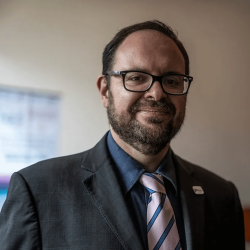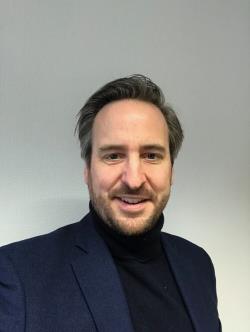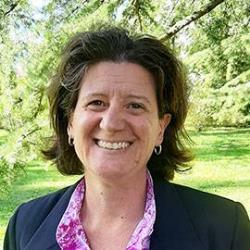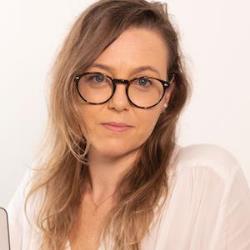WSIS Action Line C9: Milestones, Challenges and Emerging Trends in Freedom of Expression and Media Development
UNESCO
Session 155
20 Challenging years of multi-stakeholders’ contributions and innovation to Media Development
This session will focus on WSIS Action Line C9, which addresses the pivotal role of media in shaping the Information Society during the last two decades. It will also examine the impact of information technology on the safety of journalists, especially women journalists. The session will delve into media development, emphasizing efforts to strengthen media systems, promote professional journalism, and ensure diverse and independent media landscapes. Overall, building on the strategies that have been implemented, their results and lessons learned, it will outline ongoing challenges and provide suggestions for the way forward in the implementation of the Action Line.

Albertina Piterbarg is an electoral expert and journalist at the UNESCO Freedom of Expression and Safety of Journalists section. She has more than 20 years of experience working in elections in the areas of communication for development, electoral-related conflict prevention, and women’s political participation. She has served in diverse capacities across international organizations such as the Organization of American States (OAS), UN Peacekeeping Operations, UNDP, UN Women, and UNOPS, ranging from head of office, team leader, field officer, government advisor, and independent consultant. Throughout her career, Albertina has undertaken numerous missions across Africa, Asia, and Latin America, including countries such as Niger, Ivory Coast, Tunisia, Libya, East Timor, New Caledonia, Mexico, Bolivia, Colombia, Ecuador, the Dominican Republic, and Venezuela, among others.
Albertina studied Philosophy and Literature at the University of Buenos Aires in Argentina and a master’s in Journalism at Saint Andrews University in Argentina, where she was bestowed with the Outstanding University Graduate Award 2018.

Guilherme Canela holds the position of chief of the section of Freedom of Expression and Safety of Journalists at UNESCO headquarters in Paris. For 8 years, he held the position of Communication and Information Regional Adviser for Latin America and the Caribbean at UNESCO Montevideo Office. During those years, he performed as Regional Coordinator of the UNESCO Initiative for the Promotion of Democracy and Freedom of Expression in judicial systems in Latin America. He was also the Secretary of the Regional Committee of the UNESCO Memory of the World Programme for Latin America and the Caribbean, and focal point of the Organization for issues related to the safety of journalists. He has a B.A. in International Relations from the University of Brasília (UNB) and a Master’s Degree on Political Science from the University of São Paulo (USP).

Renaud de Villaine has been working for more than ten years with OHCHR where he held various positions, including desk officer on African countries, field officer in the Democratic Republic of Congo, and legal advisor to the commissions of inquiry on Eritrea and Burundi. He is currently serving as advisor on media freedom and the safety of journalists. Before joining OHCHR, Renaud worked for non-governmental organizations both in European Union liaison offices in Brussels and in Liberia. He holds a master’s degree on human rights and humanitarian law at the University Paris II Panthéon-Assas.

Caroline Vuillemin has been the General Director of Fondation Hirondelle since 2017. Fondation Hirondelle is a Swiss non-profit organization founded in 1995 that provides information to populations facing crises, empowering them to take action in their daily lives and as citizens. Her career reflects a commitment to international development in the field of good governance, democratic participation, and access to information, particularly in Africa. She joined Fondation Hirondelle in December 2003. She was in charge of the Radio Okapi project (the United Nations radio station in the DRC created in partnership with Fondation Hirondelle) before taking over as Director of Operations in 2008. Committed to helping public-interest media, including radio, meet the economic, governance, and technological transformation challenges they face, she is a board member of the Global Forum for Media Development (GFMD). Prior to Fondation Hirondelle, she worked for the International Foundation for Election Systems (IFES), where she took part in numerous electoral observation missions in the DRC, South Africa, and Nigeria. Caroline Vuillemin holds a bachelor's degree from the Institut d'études politiques de Lyon, complemented by a degree in international relations from Georgetown University in Washington, DC.

Natália Leal is the CEO of Lupa, a reference digital platform for combating disinformation through journalism and media education. She leads a team of 30 people, recognized by the World Association of Publishers as the best credibility initiative in the Americas in 2023. For her work leading Lupa in product direction and the company's financial sustainability strategy, she was recognized by the International Center for Journalists (ICFJ) with the Knight International Journalism Award in 2021. She led the team responsible for No Epicentro, an application that sought to raise awareness about the impact of COVID-19 deaths in Brazil, replicated by The Washington Post and recognized as the best visualization given in almost a dozen international journalism awards. She is a journalist from UFRGS and a specialist in human resources management and business management from Fundação Getulio Vargas (FGV).
-
 C3. Access to information and knowledge
C3. Access to information and knowledge
-
 C9. Media
C9. Media
-
 C10. Ethical dimensions of the Information Society
C10. Ethical dimensions of the Information Society
This session is linked to several WSIS Action Lines, particularly:
C3: Access to Information and Knowledge - Promoting freedom of expression is integral to ensuring access to information and knowledge. The strategies and lessons discussed in the session would directly support this action line by fostering environments where information is freely shared and accessible.
C9: Media - This action line focuses on the role of media in the information society, including the safety of journalists.
C10: Ethical Dimensions of the Information Society - Addressing the safety of journalists and freedom of expression touches on ethical considerations in information dissemination and the protection of rights within the information society, directly linking to C10.
These connections highlight the session's relevance to the broader goals of WSIS, emphasizing the importance of a safe and open environment for information exchange and technology looking into the future.
-
 Goal 5: Achieve gender equality and empower all women and girls
Goal 5: Achieve gender equality and empower all women and girls
-
 Goal 16: Promote just, peaceful and inclusive societies
Goal 16: Promote just, peaceful and inclusive societies
This session is linked to several SDGs, particularly:
SDG 5: Gender Equality - The session addresses issues related to the safety of women journalists and the promotion of gender equality in media representation, supporting SDG 5.2, which aims to eliminate all forms of violence against women and girls.
SDG 16: Peace, Justice, and Strong Institutions - The session will emphasis on safeguarding journalists and promoting freedom of expression directly supporting SDG 16.10, which aims to ensure public access to information and protect fundamental freedoms, in accordance with national legislation and international legal frameworks.
UNESCO's Media Development Indicators
UN Plan of Action on the Safety of Journalists and the Issue of Impunity
World Trends in Freedom of Expression and Media Development
Windhoek+30 Declaration: Information as a public good
The Chilling: global trends in online violence against women journalists; research discussion paper
Guidelines for the Governance of Digital Platforms